Make reading a book your New Year's resolution
Updated: 2015-01-22 07:50
By Peter Gordon(HK Edition)
|
|||||||
The news came in over the weekend that Dymocks, a bookstore chain focused mostly on English-language books, was closing down in Hong Kong.
A sign of the times, perhaps, but as with most such signs, the portents are unclear. One might expect that as a publisher (Chameleon Press publishes local poetry and literature) and book review editor, I would reflect on those memorable lines from English poet John Donne: ask not "for whom the bell tolls: it tolls for thee", but I must admit that in fact I greeted the news with equanimity. So-called "bricks and mortar" bookstores have never been a major channel for Chameleon's books: Only a tiny percentage of our sales have ever gone through local bookstores, even or especially when sales reached into the thousands of copies per title, as recently happened.
Complaints about Hong Kong bookstores have been common for as long as I can remember. Singapore, it was pointed out, had more than one "seriously large" bookshop - Kinokuniya, for example, or Borders. It also had and probably still has, not coincidentally, a more vibrant English-language publishing industry.
The reasons why are more complex than just reading habits and rents, the explanations normally bandied about at times like these. The first is that the English-language book market in Hong Kong is really rather small. I used to estimate it, based on circulations of the English-language periodicals, at perhaps a quarter million, a bit larger perhaps if one includes children's books. This is the size of a medium-sized American or British town, making the number of English-language booksellers here look remarkable. The Singapore market is considerably larger.
A second problem is staff: Bookstores, especially large bookstores, are much enhanced by staff with "product knowledge". Hong Kong people literate enough, to say nothing of fluent enough, in English to be of significant assistance, are also likely to have better-paid opportunities with better career prospects.
Only then does one get to the questions of rent, e-books and the oft-lamented, but less often documented, decline in reading habits. Bookstores are particularly susceptible to competition from e-commerce, since online booksellers (in the interests of full disclosure. I'll note we have one of those as well) can offer the complete universe of products, which no physical bookstore can, leaving little room for even the sort of specialized sellers that might carve out a niche in other retail fields. It is no accident that books were the first field in which e-commerce made a major splash, here as well as globally.
How all of this affects reading is less clear. Bookstores can be marvelous places - as were record stores - but one should not confuse nostalgia with reality. The disappearance of record stores, however, has not been accompanied by a clear decline in music production or consumption. Hong Kong people certainly read: The large number of periodicals is evidence of that. But Hong Kong, it has often been remarked, is not a place where people read books - an observation sometimes based on anecdotal comparisons between the reading habits of MTR passengers with those of New York, Paris and London. It is, however, an observation belied by the heavy use of Hong Kong's public libraries. The jury, I think, is still out on this question.
Dymocks' fate coincides with the publication of Japanese novelist Minae Mizumura's The Fall of Language in the Age of English in which she discusses what she sees as the decline of literature - Japanese in particular, French in passing and by extension literature in general - due to the role of English as the "universal language". It is an interesting thesis, one of particular relevance to Chinese writers and readers. But whether or not she has correctly identified cause and effect, there is, after all, something to be said for books as opposed to, or at least in addition to, newspapers, blog-posts and even long essays in serious journals. Reading a book is an immersive experience and one which serves an intellectual purpose which is hard to match any other way. This is true even of light fiction - readers must create their own images of scenes and imagine characters' voices, things which are handed to them on a plate in other media - and it is especially true of "better" books, whether literature or non-fiction.
Such books pre-dated the modern bookstore and will, one imagines, survive them. It is not however something to be taken for granted. The e-book revolution has hardly finished playing out; what emerges from e-reading may not be "books" in the sense we have come to know them over the past few centuries. In the race for high test scores, schools may risk down-playing reading, and reading in depth, for its own sake. "Read a book", therefore, sounds a like a good - and achievable - New Year's resolution.

(HK Edition 01/22/2015 page1)